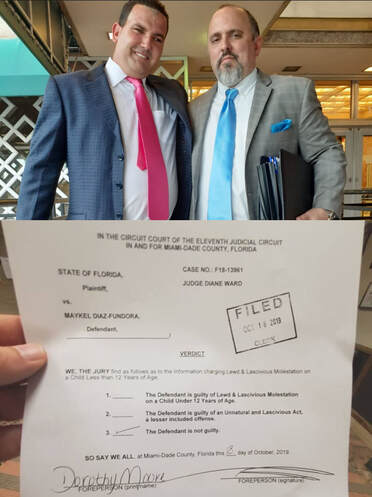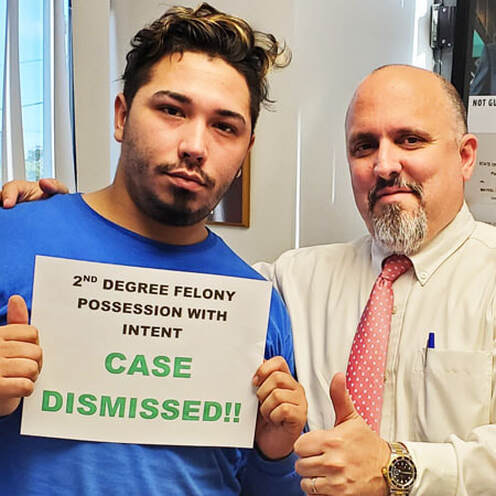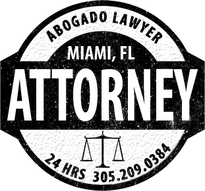Miami Criminal Defense Attorney Dennis Gonzalez Jr.
In Florida, crimes are classified into two main categories: felonies and misdemeanors. Felonies are considered more severe, and their consequences may include imprisonment, fines, loss of various rights, deportation, and a permanent criminal record. With so much at risk, it is crucial to enlist the help of a skilled criminal defense attorney.
Miami Criminal Defense Lawyer Dennis Gonzalez Jr. is renowned for offering top-notch legal representation to those accused of crimes in South Florida. Our legal team, well-versed in both Florida and Federal Criminal Punishment Codes, possesses the expertise and experience that can make the difference between freedom and incarceration. If you are facing felony charges, we will tenaciously defend you and work relentlessly to safeguard your rights.
Call Us At 305-209-0384 For A FREE Consultation!
Miami Criminal Defense Lawyer Dennis Gonzalez Jr. is renowned for offering top-notch legal representation to those accused of crimes in South Florida. Our legal team, well-versed in both Florida and Federal Criminal Punishment Codes, possesses the expertise and experience that can make the difference between freedom and incarceration. If you are facing felony charges, we will tenaciously defend you and work relentlessly to safeguard your rights.
Call Us At 305-209-0384 For A FREE Consultation!
Florida Felony Categories - Miami Criminal Defense Attorney
Felonies in Florida are classified into various levels of severity. Capital felonies and life felonies are the most serious, with potential punishments including the death penalty or life imprisonment, respectively. Other felony categories in Florida are:
Typical Miami Criminal Charges are:
Florida's Criminal Punishment Code
Florida employs a scoring system known as the Criminal Punishment Code (CPC) to determine the minimum allowable sentence for a felony. Under the CPC, a felony is assigned an "Offense Level" ranging from 1 to 10, which carries a corresponding point value. To calculate a score, crimes are designated as "Primary Offense," "Additional Offenses," and "Prior Record" and assigned a total number of points under a legislated ranking system.
The more severe the crime, the higher the ranking and the greater the number of assigned points. A score exceeding 44 points will result in a minimum sentence of 1 year in prison. It is important to note that Florida has abolished parole. Moreover, the CPC assesses additional points under specific circumstances, such as victim injury, legal status violations, community sanction violations, firearm/weapons violations, prior serious felonies, and enhancement multipliers.
Individuals with two or more prior felony convictions may face enhanced penalties under Florida law. These enhancements can include designations such as violent career criminals, habitual felony offenders, habitual violent felony offenders, three-time violent felony offenders, and prison releasee re-offenders (PRRP).
Felonies in Florida are classified into various levels of severity. Capital felonies and life felonies are the most serious, with potential punishments including the death penalty or life imprisonment, respectively. Other felony categories in Florida are:
- First Degree Felonies — punishable by up to 30 years in prison or probation and a fine of up to $10,000
- Second Degree Felonies — punishable by up to 15 years in prison or probation and a fine of up to $10,000
- Third Degree Felonies — punishable by up to 5 years in prison or probation, and a fine of up to $5,000
Typical Miami Criminal Charges are:
- Aggravated Assault: This second-degree felony involves committing an assault with the use of a deadly weapon.
- Aggravated Battery: Aggravated battery, which can involve the use of a weapon, deadly weapon, firearm, infliction of serious bodily injury, or battery on an elderly person, combines the elements of battery with the intentional or knowing causation of significant harm or the utilization of a deadly weapon during the act.
- Arson: Arson involves the intentional burning of a building or structure, encompassing homes, building materials, and ammunition stores. The penalties for arson are more severe when the perpetrator knows or should reasonably know that the building is occupied.
- Burglary: Entering or remaining in a dwelling, structure, or conveyance with criminal intent, this offense can be charged as a first, second, or third-degree felony, depending on the circumstances.
- Child Abuse: Encompassing emotional, physical, or sexual abuse, neglect, or abandonment of a child by a parent or caretaker, this crime may be classified as a life, first, second, or third-degree felony.
- Carrying a Concealed Weapon: Individuals aged 21 or older who are U.S. citizens or permanent resident aliens and eligible to own a gun under state and federal law can obtain a concealed carry permit. Carrying a concealed firearm without a permit is a third-degree felony.
- Cultivation: Drug cultivation, grow houses, and production activities refer to the illegal creation of controlled substances. These activities include any preparations for planting, harvesting, or tending to such substances.
- Crypto Currency Legal Expertise: The growing popularity of cryptocurrencies has caught the attention of federal investigators, who are increasingly scrutinizing their use in potential criminal activities and fraud.
- Drone Law Defense: The rising popularity of remote-controlled drones as a hobby in Florida and across the nation has led to an increase in hobbyists facing criminal liability under Florida Statute 810.14, it's illegal to film someone in their home or apartment without their consent. Commonly referred to as the "peeping tom" law.
- Drug Paraphernalia: Drug paraphernalia charges in Florida cover a wide range of equipment, products, and materials associated with controlled substances. These charges can lead to severe penalties and a lasting impact on your life.
- Drug Trafficking: Intentionally engaging in the sale, purchase, manufacture, delivery, possession, or transportation of controlled substances above statutory weight limits. Punishments range from a minimum of 3 years in prison and fines up to $50,000 to life without parole, depending on the substance and amount.
- Fraud Crimes: Fraud crimes in Florida are taken seriously by state and federal authorities, with convictions resulting in severe penalties like imprisonment, fines, probation, and restitution. Fraud convictions can also negatively impact professional opportunities, especially for those in accounting, banking, or finance sectors.
- Grand Theft: Knowingly obtaining, using, or attempting to acquire another person's property valued at $750 or more with the intent to either temporarily or permanently deprive the owner of their property.
- Kidnapping: Confining, abducting, or imprisoning another person against their will is considered a first-degree felony.
- Money Laundering: White collar crimes are severe offenses in Florida, and both state Attorney General and federal law enforcement agencies diligently prosecute these cases. With powerful legal teams and substantial financial resources, the government holds an unfair advantage over defendants in white collar crime cases.
- Murder / Homicide: The intentional killing of another person can be charged as a capital, life, first, second, or third-degree felony. First-degree murder is a capital felony punishable by death.
- Possession of a Controlled Substance: Facing charges for possession of a controlled substance in Florida can have severe consequences, including hefty fines, imprisonment, and a permanent criminal record that can tarnish your reputation.
- Robbery: Taking money or property from another person's possession using force, violence, assault, or fear. If a weapon is involved, the crime is charged as a first-degree felony; otherwise, robbery is a second-degree felony.
- Sexual assault: any non-consensual sexual activity without his or her consent, this includes inappropriate touching, child sexual abuse, penetration, sexual intercourse, and forced kissing. Sexual assault can be charged as a first, second, life, and/or capital felony.
Florida's Criminal Punishment Code
Florida employs a scoring system known as the Criminal Punishment Code (CPC) to determine the minimum allowable sentence for a felony. Under the CPC, a felony is assigned an "Offense Level" ranging from 1 to 10, which carries a corresponding point value. To calculate a score, crimes are designated as "Primary Offense," "Additional Offenses," and "Prior Record" and assigned a total number of points under a legislated ranking system.
The more severe the crime, the higher the ranking and the greater the number of assigned points. A score exceeding 44 points will result in a minimum sentence of 1 year in prison. It is important to note that Florida has abolished parole. Moreover, the CPC assesses additional points under specific circumstances, such as victim injury, legal status violations, community sanction violations, firearm/weapons violations, prior serious felonies, and enhancement multipliers.
Individuals with two or more prior felony convictions may face enhanced penalties under Florida law. These enhancements can include designations such as violent career criminals, habitual felony offenders, habitual violent felony offenders, three-time violent felony offenders, and prison releasee re-offenders (PRRP).
Additional Consequences of a Miami Felony Conviction
Apart from prison time and substantial fines, a felony conviction results in a permanent criminal record that cannot be expunged. This can hinder your ability to find employment, acquire a professional license, rent a home, or obtain government-funded college loans. Furthermore, you will lose some of your civil rights, including the right to own a firearm and the right to vote. If you are not a U.S. citizen, almost any felony conviction can lead to your deportation.
Consult with Miami Felony Lawyer Dennis Gonzalez Jr.
If you are facing felony charges in Florida, the potential consequences are severe, including significant prison time. The most effective way to protect your freedom and reputation is by collaborating with our skilled criminal defense attorneys. Driven by the belief that everyone accused of a crime is innocent until proven guilty, we will tirelessly defend you.
Our legal team will take the time to explain all of your rights, advise you of your options, and build the most effective defense strategy. We will conduct a thorough investigation, gather evidence, identify and interview witnesses, and collaborate with a team of outstanding private investigators and criminal experts, all in pursuit of securing an acquittal. When you become our client, you can rest assured that we will never stop fighting for you.
Please contact our office today to set up a free consultation. Our dedicated Miami Felony Lawyer Dennis Gonzalez Jr. is ready to help you navigate the complexities of your case and protect your rights.
Please contact our office today at 305-209-0384 for a free evaluation of your case. We are here to provide the support and expertise you need during this challenging time.
Contact our office today or fill out the convenient online contact form to schedule a free consultation.
Apart from prison time and substantial fines, a felony conviction results in a permanent criminal record that cannot be expunged. This can hinder your ability to find employment, acquire a professional license, rent a home, or obtain government-funded college loans. Furthermore, you will lose some of your civil rights, including the right to own a firearm and the right to vote. If you are not a U.S. citizen, almost any felony conviction can lead to your deportation.
Consult with Miami Felony Lawyer Dennis Gonzalez Jr.
If you are facing felony charges in Florida, the potential consequences are severe, including significant prison time. The most effective way to protect your freedom and reputation is by collaborating with our skilled criminal defense attorneys. Driven by the belief that everyone accused of a crime is innocent until proven guilty, we will tirelessly defend you.
Our legal team will take the time to explain all of your rights, advise you of your options, and build the most effective defense strategy. We will conduct a thorough investigation, gather evidence, identify and interview witnesses, and collaborate with a team of outstanding private investigators and criminal experts, all in pursuit of securing an acquittal. When you become our client, you can rest assured that we will never stop fighting for you.
Please contact our office today to set up a free consultation. Our dedicated Miami Felony Lawyer Dennis Gonzalez Jr. is ready to help you navigate the complexities of your case and protect your rights.
Please contact our office today at 305-209-0384 for a free evaluation of your case. We are here to provide the support and expertise you need during this challenging time.
Contact our office today or fill out the convenient online contact form to schedule a free consultation.
Featured client testimonials:




